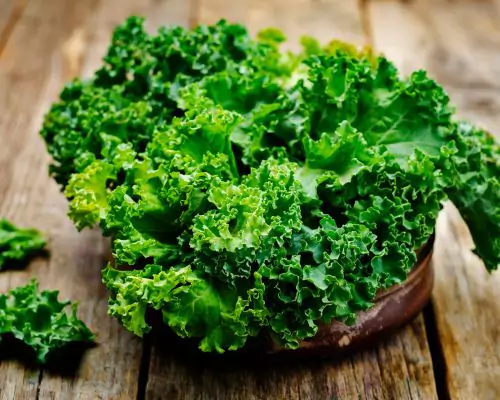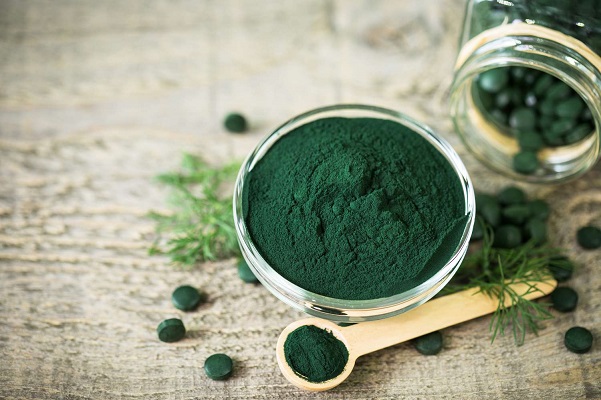On This Page
Overview
We refer to kale as the “queen of the greens” since it has numerous health advantages. Because of the global increase in popularity of plant-based superfoods, it is also being recognized as the new beef. The cabbage (Brassica) family member kale is frequently referred to as a superfood due to its high nutritional-to-calorie ratio.
A fantastic complement to practically any diet because of the numerous nutritional and physiological benefits it offers, kale is also low in fat and high in fiber.
Synonyms of Kale
- Brassica oleracea
- Cabbage
- Cole
- Colewort
- Collard
- Kail
- Borecole
- Bough
- Gelt
- lettuce
Nutritional Facts of Kale
Per 100 g of kale contains:
| Energy: | 49 kcal |
| Carbohydrates: | 8.8 g |
| Sugars: | 2.3 |
| Dietary fiber: | 3.6 g |
| Fat: | 0.9 g |
| Protein: | 4.3 g |
Phytochemical Constituents of Kale
- Glucosinolates
- Polyphenols
- Carotenoids
Therapeutic Uses of Kale
- Improves Bone Health
Due to its high vitamin K content, kale helps the body better absorb calcium for the development of stronger bones by altering bone matrix proteins. Making kale a regular part of your diet will give you access to an excellent quantity of calcium, protein, and vitamin K, all of which are crucial for the health of your bones and the functioning of your cells.
- Aids In Diabetes Treatment
About 0.6 grams of fiber, a food that decreases blood glucose levels in people with type 1 diabetes, can be found in one cup of freshly chopped kale. The blood sugar levels of people with type 2 diabetes can also get better.
- Kale Fights Inflammation
To maintain good health, it’s important to reduce inflammation in the body, and kale’s high omega-3 fatty acid content can help with that. To reduce your risk of inflammation and chronic disease like Irritable bowel syndrome, you must eliminate refined carbs, drinks, and red meat from your diet and replace them with more fruits and vegetables. Processed foods and foods with a high-fat content also cause inflammation in the body.
- Enhances Brain Health
Omega-3 fatty acids are essential for maintaining brain health, and the kale has them. Omega-3 fatty acids can also aid in lowering blood sugar, which otherwise ages brain cells and impairs neuronal health.
Home Remedies Kale
- Exfoliate the skin
You may use kale to naturally exfoliate your skin. Combine two parts coconut oil with two parts freshly minced or powdered kale. After applying the mixture to your dry areas, rinse with warm water.
- Weight Loss
If you incorporate kale into a calorie-restricted diet that mostly consists of moderate portions of nutrient-dense foods, you may benefit from weight loss.
- Hair Repair Mask
Kale helps to promote hair growth to get benefits from making its hair mask. Add 1 tablespoon of mashed avocado, 1/2 cup of yogurt, 1/4 cup of coconut milk, and 1 teaspoon of kale juice to a mixing bowl. Whip it until all the ingredients are thoroughly combined. Apply the mask from the hair roots to the ends after misting your hair with water and applying it with a brush or squeeze bottle. Put the mask on, loosely bun your hair, and wait around 30 minutes. Shampoo and condition as usual afterward.
- For Eczema
Kale is very beneficial to manage the symptoms of eczema. incorporating Kale into your diet helps you ease the symptoms of eczema.

Have A Health Issue?
Consult Online
- Dr. Sahil Gupta (B.A.M.S., M.H.A.)
Ayurvedic Allergy Specialist
CEO & Founder of IAFA®
Ayurvedic Aspects of Kale
One of our favorite vegetables for high Pitta and Kapha is kale. It is cooling for pitta, in contrast to spinach. Fiber and a bitter flavor increase peristalsis, which promotes regular bowel movements. Additionally, a bitter taste enhances bile movement, easing liver and gallbladder congestion.
Goitrogens, which are found in raw kale, are substances that can interfere with thyroid function. Cooking or heating can quickly deactivate these compounds. The high vitamin K content of kale may cause clotting in susceptible people and may interact with blood thinners.
Daily Dose: You should eat no more than 2 ½ cups of kale per week.
Side Effects of Kale
- High Risk of Iodine Deficiency
Goitrogens, a special substance found in kale These substances may prevent the thyroid gland from absorbing iodine, resulting in an iodine deficit and seriously affecting the body’s normal metabolic function. So, kale should be avoided by those who have thyroid problems.
- Allergies
Kale’s potent antioxidant quality makes it possible for allergic responses to occur. An excess of antioxidants may cause allergies by upsetting the hormonal balance. As a result, it’s crucial to consume this vegetable in moderation.
Some typical symptoms of kale allergy include swollen eyes, runny nose, itchy throat, irritation in the eyes, skin rashes, nausea, and dizziness.
- May Cause Iron Toxicity
It might not be a good idea for your health to consume too much kale. High iron concentration raises the possibility of iron poisoning in the body. High iron levels might result in headaches, chronic fatigue, gastrointestinal problems, and other symptoms.
- Hyperkalemia
A disorder called hyperkalemia is characterized by elevated potassium levels in the blood. Chest pain, weariness, diarrhea, and muscle weakness are all possible signs of hyperkalemia. If you consume excessive amounts of kale you can experience hyperkalemia.
Conclusion
A well-liked cruciferous vegetable is a kale. It also provides a wealth of beneficial health advantages. Improved mood and immunity, enhanced bone health, protection from heart diseases, and healthy weight loss are just a few of the health advantages of consuming kale.
Unfortunately, consuming too much kale might have some undesirable side effects. If any side effects from kale arise or if you have a kale allergy you can book your appointment with Dr. Gupta at IAFA® for consultation. He treats all sorts of allergies through natural herbs.
References
- https://en.wikipedia.org/wiki/Kale#:~:text=Raw%20kale%20is%20composed%20of,(DV)%20(table).
- https://www.ncbi.nlm.nih.gov/pmc/articles/PMC8123472/#:~:text=The%20main%20phytochemicals%20found%20in,glucosinolates%2C%20polyphenols%2C%20and%20carotenoids.
- Chamovitz D. Research on cruciferous vegetables, indole-3-carbinol, and cancer prevention: A tribute to Lee W. Wattenberg. Mol Nutr Food Res. 2016;60(6):1228-1238. doi:10.3410/f.726119124.793546251.









